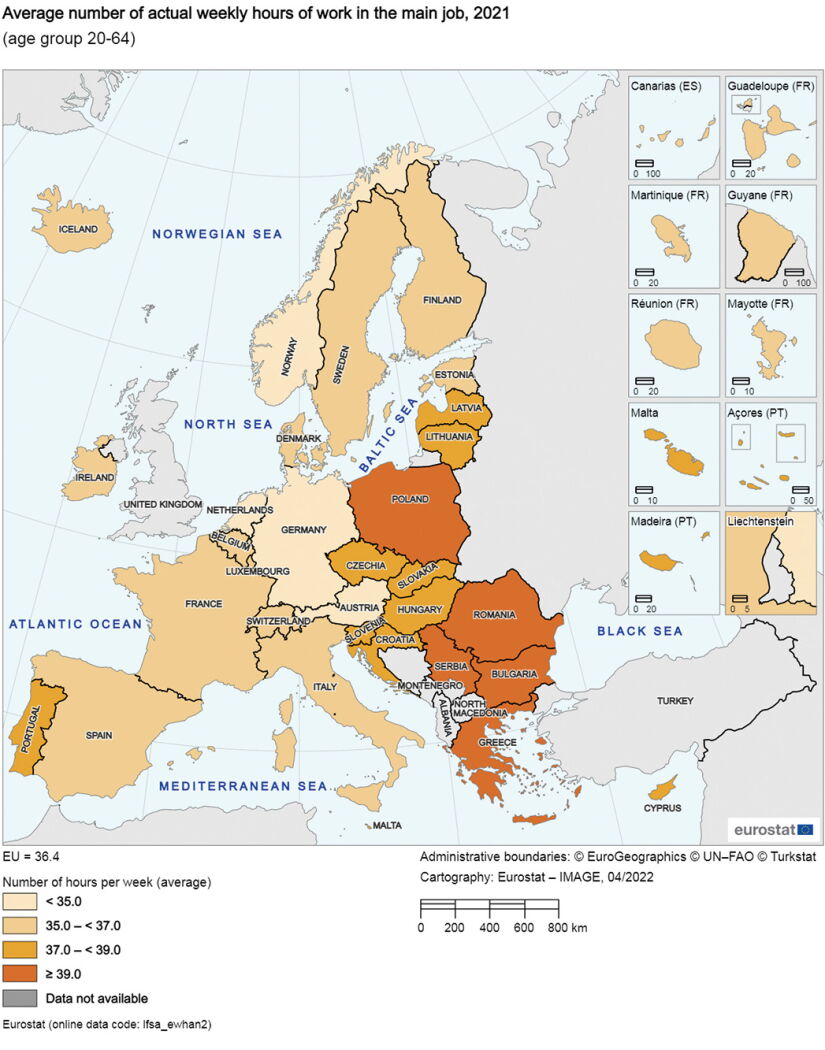Is Poland ready for a 7-hour work day?
Are you ready to work one hour less every day? A proposal to shorten the work week has sparked discussion amid claims that it can reduce burnout and improve efficiency in the Polish workforce. BY Anna Rzhevkina

Are you ready to work one hour less every day? A proposal to shorten the work week has sparked discussion amid claims that it can reduce burnout and improve efficiency in the Polish workforce. BY Anna Rzhevkina

Would working one hour less per day improve productivity? Poland’s center-left political alliance the Left (Lewica) argues it would and is actively pushing to change labor regulations. In September, the alliance submitted a bill to the lower house of parliament to cut the work week from 40 to 35 hours per week. Left representative Magdalena Biejat underscored that the bill does not dictate to employers and employees how to spread the reduced working time over the week, giving them flexibility. Salaries would remain unchanged.

The alliance cited the experience of other European countries, such as France and Denmark, to prove that a solution would be beneficial for the economy and well-being of employees. The bill suggests reducing the number of working hours to 38 in the first two years, and moving to 35 hours in the third year. “We will work more efficiently and we will work better, and at the same time we will have more time for the family or education,” Biejat said.
Cutting the length of the work week is not a new idea in Poland. In 2018, left-wing party Left Together (Lewica Razem) gathered signatures for a bill draft to gradually shorten the working week, while keeping income unchanged. However, the proposal didn’t receive enough support to be considered by parliament. In July this year, opposition leader Donald Tusk said that his party would draw up a detailed pilot program for a four-day week before next year's parliamentary elections.
The benefits of a shorter week include a lower risk of burnout, more time to spend with family and friends, and better focus during work hours. On the other hand, there are industries, such as healthcare or transport, where reducing working time would require hiring additional staff.
Critics also argue that Poland is not ready economically for such a solution. Cezary Kaźmierczak, president of the Union of Entrepreneurs and Employers said that if Poland wants to catch up with Western Europe’s income level in one or two decades, the idea of a shorter working week is “dangerous and harmful”. "Poland is a relatively wealthy country compared to the rest of the world. However, compared to Europe, it is not,” he told PAP. Jacek Męcina of the Lewiatan Confederation said it’s crucial to ensure that a shorter working week does not increase labor costs and is safe for the economy before moving forward with the initiative.
How many hours do Poles work every week?
Poland has the third-longest working week in the EU after Greece in Romania. Polish employees work on average 39.7 hours per week compared to the EU average of 36.4 hours. By contrast, the Netherlands had the shortest average working week of 32.2 hours, followed by Austria and Germany. The statistics, however, do not take into account the number of public holidays and vacations.
The average number of vacation days in Poland is 25, the same as the EU average. Taking holidays into account, employees on permanent work contracts (Umowa o pracę) actually work 4.42 days per week, according to the Polish Economic Institute (PIE). As a result, a Pole on a permanent contract works 35.4 hours per week, PIE calculated.
The Left, however, insists that a shorter working week is just one of the changes the Polish labor market needs. The alliance notes that most Poles work overtime occasionally, and sometimes the extra hours are unpaid. This results in stress, fatigue, and decreases any sense of security.
On the verge of burnout
People in Eastern Europe more often admit that they are struggling with burnout compared to Western Europe, according to the STADA Health Report 2022. An employee suffering from burnout syndrome usually feels tired, unhappy with their career, and gradually becomes less involved in their job. In Poland, 70% of respondents said that they had experienced feelings of burnout at least once in their lifetime - the highest result among European countries.
The authors of the proposal to cut working hours state that an 8-hour limit was introduced more than a hundred years ago by Józef Piłsudski. The six-day working week was gradually abandoned from 1973. Advocates of working seven hours a day argue that, since then, the efficiency of employees has increased more than wages have.
Rzeczpospolita’s survey in July showed that 46.6% of Poles were in favor of shortening the working time, 26.2% were against it, and 27.2% did not have a clear opinion. A four-day working week proposal, however, gained more support than the seven-hour working day.
A global trend
In several Western European countries, the shorter working day has already become a reality. France introduced a seven-hour day back in 2000 to counteract unemployment. Everything above the limit is paid as overtime. Last year, the country started rethinking the working hours further, considering whether to reduce it to 32 hours or four days a week. This has happened as companies around the world, such as Cisco, Unilever, Bolt, and Panasonic are playing with the idea of the four-day working week.
In the UK, more than 70 firms are taking part in a scheme where employees get full pay for 80% of their normal hours worked, but they must commit to giving 100% of their productivity. The trial, which started in June, will last for six months and will measure the impact of the four-day working week on productivity in various businesses.
A shorter working week has clear benefits for well-being and allows people to focus more on other areas of their life, but the issue is whether the timing is right for Poland. Rising labor costs and energy prices have been putting pressure on businesses, prompting companies to limit spending. Cutting working time, while keeping salaries unchanged, in practice could mean even higher costs. In France, for example, most people, especially in the private sector, work more than 35 hours and get compensation for overtime in the form of extra payment or additional days off.
As many as 74.5 of entrepreneurs said that the Polish economy is not ready for a four-day working week yet, according to the Employers of Poland association survey. The survey has not covered the option of a seven-hour workday, but when it comes to working fewer days a week, representatives of the transport, medical, tourism, and energy sectors are clearly against it. In total, about one-third of respondents said a shorter working week could be a long-term possibility, with marketing, finance, consulting, and advertising companies being generally more open to the idea.